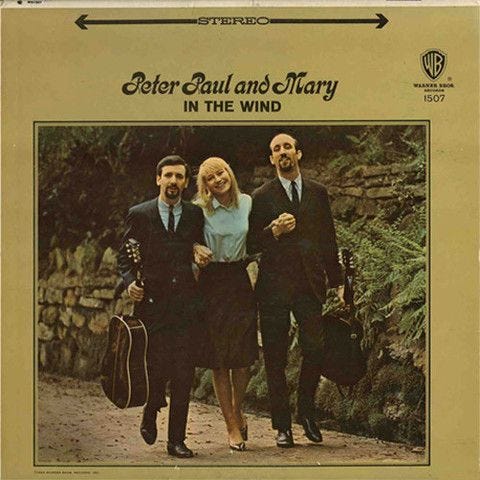“If religion were a thing that money could buy, the rich would live and the poor would die…”
From “All My Trials”, author unknown—thought to be based on a Bahamian lullaby.
Enjoy the full lyrics here.
Folk music has long partnered with political activism. One standout example, of course, was the 1963 March on Washington organized by civil rights leader, Dr. Martin Luther King, Jr. and others. Many of the prominent folk-singers of the day, including Bob Dylan, Joan Baez and Peter, Paul and Mary performed there — singing ballads that called attention to the downtrodden of our society, wars and poverty, and most importantly, an entire race of people seeking relief from stifling laws that denied them equal rights under our Constitution. There was a reason why artists from many genres attended, performed and spoke at this iconic demonstration: art stirs our passions, inspires us, and yes, it can awaken our collective souls to injustice. And folk music was, and I think remains, one major way to change peoples’ hearts and minds.
Again, I must credit my “big sister”, who attended both high school and college in the 1960’s, for exposing me to folk music before I attended elementary school, and its call to action has inspired me since.1
Speaking of inequality, the reads for this Sunday explore the income inequality chasm in our country that grows obscenely wider each day. And this income and wealth gap disproportionally impacts people of color. Could it be our “ruthless” form of capitalism at work?
— A brilliantly written piece in the New York Times Magazine, part of the Times’ “1619 Project”, explores the idea that our particularly brutal form of capitalism had its origins in the history of slavery and the Southern plantations, and this is a major reason why the White—Black wealth gap persists today.
“ ‘American slavery is necessarily imprinted on the DNA of American capitalism,’ write the historians Sven Beckert and Seth Rockman.”
https://www.nytimes.com/interactive/2019/08/14/magazine/slavery-capitalism.html
— This “Master Class” primer on income and wealth inequality explains the basics: what it is, how it started, what keeps it going and expanding…
https://www.masterclass.com/articles/what-is-income-inequality#what-is-income-inequality
— The Pew Research Center produced a statistical analysis of the trends in U.S. income and wealth inequality in January 2020, that sets the stage for understanding today’s massive gap and why it matters.
https://www.pewresearch.org/social-trends/2020/01/09/trends-in-income-and-wealth-inequality/
— And finally for this evening, a 2021 summary of the impact of income and wealth inequality on our nation’s children from The Children’s Defense Fund.
“For centuries, our nation’s policies have been intentionally constructed in a way that has disproportionately denied families with low incomes, especially families of color, the opportunity to build wealth.”
https://www.childrensdefense.org/state-of-americas-children/soac-2021-income-inequality/
Additional Reading:
https://kinginstitute.stanford.edu/encyclopedia/march-washington-jobs-and-freedom
Here’s a shout-out to a great Central Ohio nonprofit, all volunteer music organization that I have proudly volunteered with for 27 years and counting: Six String Concerts. This vibrant, committed group of folk music lovers has presented acoustic singer-songwriters from all over the world to an Ohio audience for 33 seasons.




